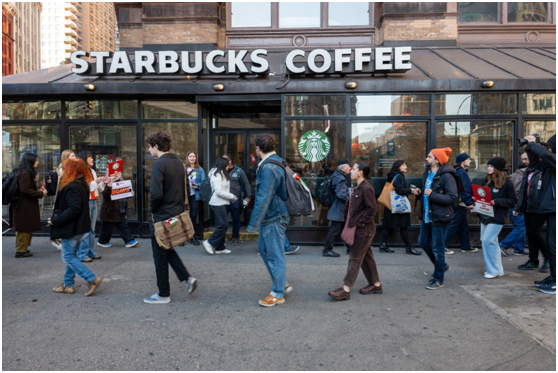
Since Starbucks disclosed a decline in sales in its financial report, the company's stock price has plummeted by over 17%. Many analysts see this coffee giant as a barometer of consumer spending, which accounts for nearly three-quarters of US economic activity. With the company's recent difficulties, a question has resurfaced: is it the engine of the US economy faltering, or is Starbucks itself having problems?
Firstly, years of inflation and high borrowing costs have left consumers feeling exhausted. Starbucks has been working hard to adapt to the post pandemic economy. In last week's financial report, the company announced a decrease of about 2% in revenue for the first three months of this year, lower than analysts' expectations. And same store sales decreased by 4%. Starbucks CEO Laxman Narasimhan, in a conference call with analysts, partially attributed the decline in sales to widespread consumer "caution" and gave an example of a decrease in visits from occasional American customers visiting the store.
In addition, the weakening of consumer enthusiasm is not limited to Starbucks. According to data released by the US Department of Commerce last week, consumer spending in the United States slowed significantly at the beginning of this year compared to the last few months of 2023. This trend coincides with stubborn inflation and a surge in credit card debt, indicating that consumers are facing challenges in dealing with rapidly rising prices and expensive borrowing costs. The weak consumption has brought pressure to catering brands outside of Starbucks. McDonald's, a fast-food giant, reported a slowdown in sales earlier this month, as did KFC and Pizzahut, which are owned by Yum! Brands.
Secondly, in the context of a slowdown in consumption, Starbucks has encountered some specific challenges. The labor organization representing catering workers posted a message on social media expressing solidarity with Palestinians, although it was later deleted. This incident led Starbucks to sue the union in October last year. The news from the union subsequently sparked calls to boycott Starbucks, as some people seemed to mistake the union's position for the company's position. Starbucks responded to previous media requests by saying, "As violence against innocent people continues in the region, some people mistakenly associate these remarks with us because the Workers' Union and its affiliated institutions and members use our name, logo, and intellectual property."
Obviously, Starbucks' difficult times may not change quickly. Wedbush analyst Nick Setyan told the media that the workers' union representing approximately 400 Starbucks store workers has had a negative impact on the company's perception through strikes and other labor actions. After reaching an agreement in February to restart negotiations, contract negotiations are currently underway.
It can be seen that Starbucks was the biggest negative news during this quarterly report period. In the past 20 years, Starbucks has only reported negative performance twice: during the pandemic and during the financial crisis. In other words, Starbucks has always only reported negative performance during economic downturns. Such a difference in the US market indicates that leading stocks like Starbucks can foreshadow the future of the economy. Wall Street has always regarded Starbucks as a barometer of consumer confidence in the United States, with people believing that coffee drinks are discretionary expenses. When the economy is strong, affluent consumers will buy a few more Starbucks at will; When the economy is bad, Starbucks becomes the first expense to be cut.
In summary, in such a wave of change, true strength and value will be tested when the market recedes, and brands that only follow the trend and lack uniqueness may face the risk of being eliminated by the market. For Starbucks, adjusting its market positioning, optimizing its cost structure, and truly showcasing its own cost-effectiveness will be an important path for its revival.

The South Korean political arena has once again been embroiled in a public controversy over a judicial investigation that has shaken the entire nation.
The South Korean political arena has once again been embroi…
On the morning of December 29th local time, the precious me…
According to the US media Barchart, recently, the fluctuati…
On December 29th, Mar-a-Lago in Florida, USA, witnessed a h…
SoftBank Group announced on Monday that it has agreed to ac…
Recently, the US State Department issued a visa ban, adding…